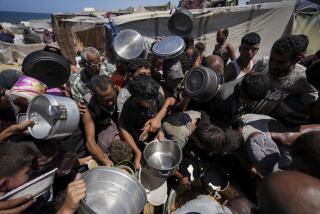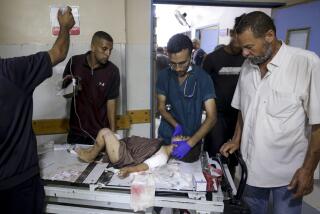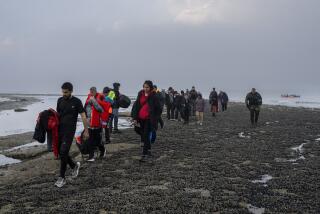Shelling Halts South Yemen Pullout : But 400 Are Evacuated; Leader Reportedly Flees Country
- Share via
ABU DHABI, United Arab Emirates — Heavy shelling forced Queen Elizabeth II’s yacht Britannia and other ships to halt an emergency evacuation of foreigners from war-torn South Yemen on Saturday. One source reported that the Marxist country’s head of state, Ali Nasser Hasani, had fled the country to Ethiopia.
The Britannia, diverted from a voyage to Australia, managed to evacuate about 400 people of 25 nationalities before suspending the operation, leaving more than 100 people behind, including an estimated 40 Britons, officials said.
The yacht arrived in Djibouti, a former French colony about 150 miles southwest across the Gulf of Aden, Saturday night. Three Soviet ships, reportedly carrying about 1,000 evacuees, mostly Soviets, arrived earlier Saturday in Djibouti.
Soviet Casualty Reported
French news reports said a Soviet citizen was killed Friday night in the fighting, which pits South Yemen’s Marxist leadership against a more radical rebel faction.
Israel radio, meanwhile, reported that Hasani had flown to Marxist Ethiopia aboard his personal plane.
The broadcast quoted Michael Gurdus, a private Israeli shortwave radio monitor, as having said that Hasani’s pilot, after hours of refusal by the Ethiopians, finally received permission to land at Addis Ababa. Gurdus has had long experience monitoring events in the Arab world by radio.
According to Gurdus, Ethiopia originally refused the South Yemeni jet permission to land, and the pilot--telling air controllers that he had “a very important person on board”--landed at Sana, the capital of Yemen, which borders South Yemen on the northwest. The pilot, continuing to negotiate by radio with the Ethiopians, later confirmed that Hasani was aboard, and the Addis Ababa control tower then gave him permission to land, Israel radio quoted Gurdus as saying.
In South Yemen, small boats from the yacht Britannia were ferrying evacuees from a beach near Aden, the capital, until tanks, apparently supporting the Communist rebels in their six-day-old battle against government forces, overran the evacuation zone, the captain of the yacht reported. It was not known if the rebels were trying to block the evacuation.
South Yemeni officials said government forces were in “full control” of the country, but other Yemeni sources said reinforcements of tribesmen loyal to the rebels were descending from nearby mountains into the capital.
“The threat of an all-out civil war is still there,” one well-informed source said.
The Bahrain-based Gulf News Agency said that as many as 9,000 people had been killed or wounded in Aden alone and added that there was also fighting in the north of the small country, which guards the southern approach to the Red Sea. The news agency attributed its report to official sources in Sana.
The Britannia’s skipper, Rear Adm. John Garnier, told the British Broadcasting Corp. that “a raging battle” erupted between the two sides on the beach.
Shells Exploding Nearby
“The shells started creeping toward the embarkation point, and we then saw tanks and rebel militia coming down the beach about a mile and a half away,” Garnier said. “I had to decide to pull out our shore party.”
“The yacht did come under intense hostile fire, but no damage was reported,” said Dean Harden, a British spokesman in Djibouti.
The 3,990-ton, 412-foot-long Britannia, built for use as a hospital ship in wartime, will return to Aden if necessary after delivering its passengers to Djibouti, Harden said.
One of those rescued by the Britannia, British Ambassador Arthur Marshall, praised the ship’s crew for helping prevent a “bloodbath of unspeakable proportions.”
When told that the royal yacht was steaming toward Aden to evacuate foreign nationals, some of those trapped on the beach reportedly refused to believe it. However, when the Britannia came into view, doubt turned to jubilation.
“I can tell you the sight of the royal yacht all lit up put a lump in everyone’s throat,” Ambassador Marshall said, “and when the boats came ashore, everyone was embracing one another, hugging and tears of emotion.”
Those lucky enough to get aboard were serenaded by the royal band that usually plays for Queen Elizabeth and her guests.
A British Defense Ministry spokesman in London told Los Angeles Times correspondent Tyler Marshall late Saturday that the Royal Navy tanker Bramble Leaf was standing by just off Aden ready to rescue the estimated 120 foreign nationals still trapped on or near the beach. “There has been continuous fighting all day,” the spokesman said. “We can’t try to bring off those still there until there is a break.”
Report on Commando Unit
London’s Sunday Times reported that a squadron of Britain’s Strategic Air Services, a crack anti-terrorist commando unit, had been flown to Djibouti for possible use in airlifting the remaining Britons to safety.
At least two French ships were “standing off . . . in international waters awaiting a chance to continue the operation” after evacuating about 63 French citizens to the Britannia, a French Defense Ministry spokesman said.
Britain, France, Italy and West Germany have been working with the Soviet Union, which maintains military facilities in South Yemen, to evacuate their citizens following the collapse of Soviet-mediated peace talks Thursday.
The Soviet Union is South Yemen’s closest ally and has a large community of residents there. The port of Aden has an important Soviet naval base, and Soviets help run the armed services, the port, the airport and the civil service.
The Kremlin has maintained a strict neutrality in the fighting, urging both sides to find a peaceful settlement to their ideological differences.
The Arabic-language service of Radio Moscow on Saturday broadcast an appeal by South Yemeni Prime Minister Haider abu Bakr Attas and Foreign Minister Abdulaziz Dali for an immediate end to the fighting.
Similar appeals came from Syria, Libya, Algeria and the Palestine Liberation Organization, which with South Yemen formed the now-defunct Arab Steadfastness and Confrontation Front against Israel.
Both Sides Invited
Col. Ali Abdullah Saleh, leader of neighboring Yemen, proposed a cease-fire to be supervised by Palestinian fighters camped near Aden.
In a statement over state-run Sana radio, monitored in Abu Dhabi, Saleh invited representatives of both sides “to come immediately to Sana to start a dialogue and solve problems in a peaceful and democratic atmosphere.”
Yemen, ruled by a moderate, generally pro-Western military government, has an agreement for phased political union with South Yemen--an alternative to on-and-off border skirmishes and tensions that have prevailed since South Yemen’s independence from Britain in 1967. The PLO has maintained a contingent of around 1,000 guerrillas in Aden since its exodus from Lebanon in 1982.
Marxist Arab Country
PLO leader Yasser Arafat arrived in Sana shortly after the truce proposal was announced for what Sana radio described as “talks on recent events in Democratic Yemen.”
South Yemen, formally known as the People’s Democratic Republic of Yemen, is the only Marxist-ruled nation in the Arab world.
Fighting began there last Monday with a coup attempt by hard-line Marxists against Hasani, himself a Marxist who advocates renewed diplomatic relations with pro-Western Arab neighbors and liberalized economic policies. Hasani was reported wounded during the attempted overthrow and his regime later said it had executed the coup leaders.
The United States has no diplomatic ties with South Yemen, and State Department officials in Washington said they have no “confirmed reports” of Americans there.
More to Read
Sign up for Essential California
The most important California stories and recommendations in your inbox every morning.
You may occasionally receive promotional content from the Los Angeles Times.













